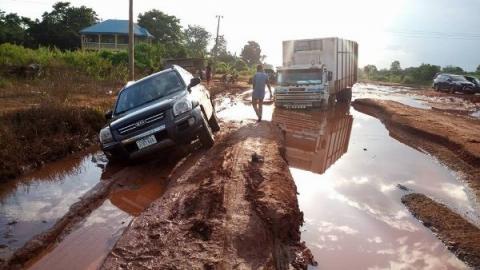In the heart of Nigeria, from the bustling urban centers of Lagos and Abuja to the serene rural landscapes, the sound of commerce is pervasive. Markets hum with activity, goods are exchanged, and livelihoods are earned. Yet, beneath this vibrant economic tapestry lies a glaring problem: the country’s dilapidated road infrastructure. Nigeria’s roads, once the arteries of economic vitality, have become significant impediments to growth. The deterioration of these critical pathways is not just a matter of inconvenience; it is a substantial barrier to the nation’s economic progress.
Nigeria’s road network, spanning over 200,000 kilometers, is a critical component of the country’s transportation system. However, a significant portion of these roads is in a deplorable state. Potholes, cracks, and erosion are common sights, turning journeys that should take hours into day-long ordeals. Rural areas are particularly affected, where roads can become virtually impassable during the rainy season.
The economic consequences of Nigeria’s poor road infrastructure are profound and multifaceted. One of the most immediate effects is on the cost of transportation. Freight trucks, which transport goods across the country, face increased fuel consumption and higher maintenance costs due to the poor road conditions. These additional costs are inevitably passed on to consumers, leading to higher prices for goods and services.
Moreover, the inefficiency in transportation affects the supply chain. Delays caused by bad roads mean that perishable goods, such as agricultural produce, often spoil before reaching markets. This not only reduces the income of farmers but also leads to higher prices and scarcity of food items in urban areas. The agricultural sector, a vital part of Nigeria’s economy, thus suffers significantly from the poor road infrastructure.
For Nigeria’s manufacturing sector, reliable transportation is essential. Factories depend on timely delivery of raw materials and distribution of finished products. The state of the roads, however, disrupts these processes. Delays and damages caused by poor road conditions increase production costs and reduce the competitiveness of Nigerian-made products in both domestic and international markets.
Furthermore, inadequate road infrastructure hampers foreign direct investment (FDI). Investors are wary of committing resources to a country where transportation inefficiencies can significantly impact business operations. The potential for growth in industries such as manufacturing, mining, and technology is thus stifled by the unreliable road network.
In rural areas, where the majority of Nigeria’s population resides, roads are lifelines that connect communities to essential services like healthcare, education, and markets. Dilapidated roads isolate these communities, making it difficult for residents to access basic necessities. This isolation exacerbates poverty and hinders rural development.
Economic activities in these regions are also severely impacted. Farmers and artisans find it challenging to transport their goods to urban markets, limiting their income potential and stalling economic development. Improved road connectivity could unlock the economic potential of rural areas, integrating them more effectively into the national economy.
The human cost of poor road infrastructure is immense. Road accidents are a common occurrence, often resulting in injuries and fatalities. The World Health Organization (WHO) reports that road traffic injuries are a leading cause of death in Nigeria, many of which are attributable to poor road conditions. The loss of life and the burden on healthcare systems are tragic consequences that highlight the urgent need for infrastructural improvement.
Quality of life is also affected. Long travel times due to bad roads mean less time for productive activities and family life. The stress and frustration experienced by commuters on a daily basis contribute to a decline in overall well-being and productivity.
Addressing Nigeria’s road infrastructure problems requires a comprehensive approach that includes significant investment and policy reform. The government must prioritize road maintenance and construction, allocating sufficient budgetary resources to this end. Public-private partnerships (PPPs) can be a viable solution, leveraging private sector efficiency and investment to improve road infrastructure.
Corruption and mismanagement have historically plagued infrastructure projects in Nigeria. Ensuring transparency and accountability in the use of funds is crucial. Implementing stringent oversight mechanisms and involving local communities in monitoring projects can help mitigate these issues.
Additionally, adopting modern construction techniques and materials can enhance the durability of roads, reducing long-term maintenance costs. Investment in alternative transportation modes, such as rail and waterways, can also alleviate the burden on road networks, providing more efficient options for transporting goods and people.
Nigeria’s economic potential is vast, but it is being significantly hampered by its dilapidated road infrastructure. The impact on transportation costs, industrial growth, rural development, and overall quality of life is profound. To unlock this potential, Nigeria must invest in its roads, adopting a holistic approach that includes financial investment, policy reform, and community involvement.
The road to economic prosperity is literally paved with good intentions and solid infrastructure. By addressing its road challenges, Nigeria can enhance its economic growth, improve the quality of life for its citizens, and establish itself as a more attractive destination for investment. It is time for Nigeria to smooth out the bumps in its economic journey and pave the way for a brighter, more prosperous future.





